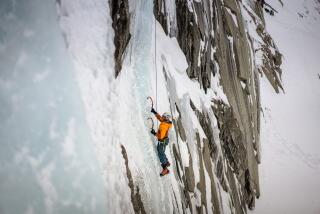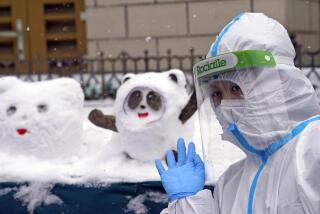Breaking the Ice With Warm Smiles
- Share via
On the first day of the new year I perched on a sheer ridge of ice and stared at Bellingshausen Station, a Soviet outpost in Antarctica. It seemed to be deserted. No one was in sight.
I climbed down from the summit and was surrounded by white silence. Frame buildings held no hint of life: no open curtain, no lamp, no smoke from a chimney, no sled by a door.
I crossed a wooden footbridge. A tanklike vehicle with peeling red paint was abandoned near a snowdrift. It could have been there for years.
Then a door creaked behind me. I jumped. A round-faced man in a blue turtleneck sweater, black pants and boots came out, his fist raised. He said: “Vladivostok, Rimsky-Korsakov. “ At least that is what I heard.
I decided that was Russian for “Welcome, stranger.” After all, he was smiling. I said: “Happy New Year.”
“Novgorod dacha dobrynin, “ he replied. At least that is what I heard.
A Pal Slides In
We both laughed and shrugged. Here we were at the bottom of the Earth, without a word in common. Then an 83-year-old pal of mine from our Lindblad tour group came sliding down the hill. He had traveled extensively in the Soviet Union. He said, in Russian, “Good day. How are you? I speak only a little Russian.”
That broke the ice, although he could not understand the enthusiastic and lengthy retort. With classic pantomime he asked permission to take photographs. Smiles were profuse. Then the Russian said to me: “ Habla Espanol? “
“Si, “ I shouted in surprise, and off we went in conversation. He had picked up Spanish phrases from his Antarctic neighbors, the Chileans, who were stationed just beyond a ravine.
In fact, he explained, the reason there was no one else in sight was because the Russians were sleeping in after a New Year’s Eve party with scientists from Chile and East Germany. The Russians had poured homemade vodka. “Mucho, “ he said, with a tip of his wrist.
Vladimir, as he introduced himself, said he had to get back to work. As we waved goodby, I said, “ Feliz Ano Nuevo. “ He called out, “ Hasta la vista. “ Not your usual U.S.-Soviet exchange.
The keenest moments of travel are often like that: Nations become individuals, crowds become people, small talk leads to laughter and friendship.
At a charming inn named Natale in the town of Cortina D’Ampezzo, I visited with an Italian-born construction worker from New York who had brought his 19-year-old son back to visit relatives in Trento.
The New Yorkers had started their tour in Germany, then drove through Switzerland and Austria. They had planned to linger in Innsbruck, but found things closed for Easter.
Always Open
And so the father had said to his son: “I know a place that is always open. We will go home to Trento.” They arrived on Easter morning, four days ahead of schedule, and the welcome had been effusive.
I thought of that recently when I stopped in Tulsa for a weekend with my mother. I arrived early from Chicago’s O’Hare and she was not at the gate. I walked to the carrousel, picked up my suitcase and went out to the curb to surprise her.
After 30 minutes I phoned home. There was no answer.
After 45 minutes I started dialing her across-the-street neighbor. That’s when I heard my name being paged.
That’s when I saw her flying down the corridor, flushed with giggles. That’s when I learned that she had doubled-checked my arrival time and accepted the word of a stranger with a computer over the word of her firstborn child. That is why she was seated in the United Airlines lounge watching TV while I stood by the curb at American.
It was not an Italian welcome, but I knew for sure I was home. And it was better than my previous visit, when she met the 10 p.m. plane on time but had locked her keys in the car.
More to Read
Sign up for Essential California
The most important California stories and recommendations in your inbox every morning.
You may occasionally receive promotional content from the Los Angeles Times.










